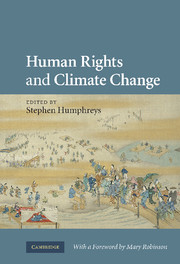Book contents
- Frontmatter
- Contents
- Authors' biographies
- Acronyms
- Acknowledgements
- Foreword
- Introduction: human rights and climate change
- PART I Rights perspectives on global warming
- 1 Competing claims: human rights and climate harms
- 2 Climate change, human rights and moral thresholds
- 3 Equitable utilization of the atmosphere: a rights-based approach to climate change?
- 4 Climate change, human rights and corporate accountability
- 5 Rethinking human rights: the impact of climate change on the dominant discourse
- PART II Priorities, risks and inequities in global responses
- Conclusion
- Appendix: climate change impacts on human rights
- Index
2 - Climate change, human rights and moral thresholds
from PART I - Rights perspectives on global warming
Published online by Cambridge University Press: 04 August 2010
- Frontmatter
- Contents
- Authors' biographies
- Acronyms
- Acknowledgements
- Foreword
- Introduction: human rights and climate change
- PART I Rights perspectives on global warming
- 1 Competing claims: human rights and climate harms
- 2 Climate change, human rights and moral thresholds
- 3 Equitable utilization of the atmosphere: a rights-based approach to climate change?
- 4 Climate change, human rights and corporate accountability
- 5 Rethinking human rights: the impact of climate change on the dominant discourse
- PART II Priorities, risks and inequities in global responses
- Conclusion
- Appendix: climate change impacts on human rights
- Index
Summary
It is widely recognized that anthropogenic climate change will have harmful effects on many human beings and, in particular, on the most disadvantaged. Specifically, it is projected to result in flooding, heat stress, food insecurity, drought and increased exposure to water-borne and vector-borne diseases. Various different normative frameworks have been employed to think about climate change. Some, for example, apply cost–benefit analysis to climate change. The Stern Review provides a good example of this approach. It proceeds by comparing the costs (and any benefits) associated with anthropogenic climate change with the costs and any benefits of a programme for combating climate change. On this basis it argues that an aggressive policy of mitigation and adaptation is justified. Whereas the costs of combating climate change, according to Stern, are quite low, the costs of ‘business of usual’ would be considerable. Other analysts adopt a second perspective and conceive of climate change in terms of its impact on security. For example, the High Representative and the European Commission to the European Council issued a statement on Climate Change and International Security which argues that climate change is ‘a threat multiplier which exacerbates existing trends, tensions and instability’. It argues that climate change will contribute to insecurities, such as tensions over scarce resources, land loss and border disputes, conflicts over energy sources, conflict prompted by migration and tensions between those whose emissions caused climate change and those who will suffer the consequences.
- Type
- Chapter
- Information
- Human Rights and Climate Change , pp. 69 - 90Publisher: Cambridge University PressPrint publication year: 2009
- 46
- Cited by



